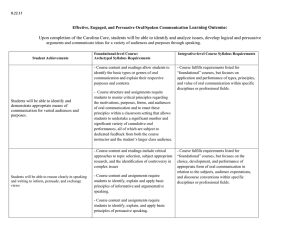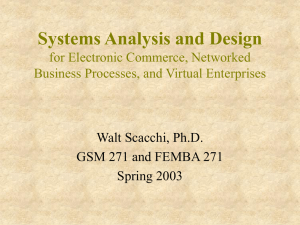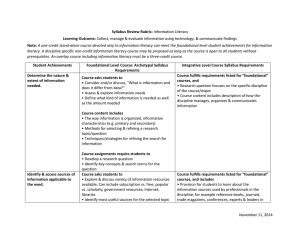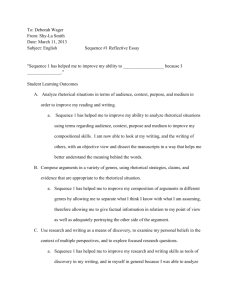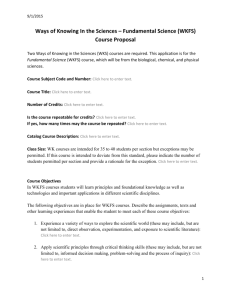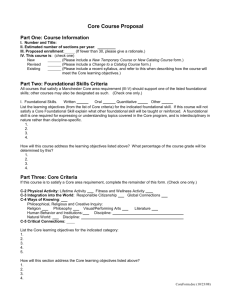Syllabus Review Rubric: Effective and Persuasive Communication (Writing)
advertisement
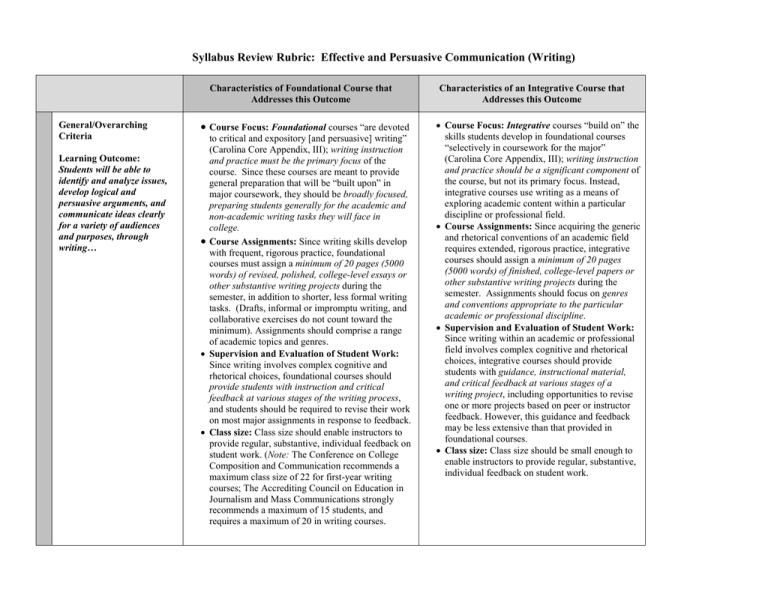
Syllabus Review Rubric: Effective and Persuasive Communication (Writing) Characteristics of Foundational Course that Addresses this Outcome General/Overarching Criteria Learning Outcome: Students will be able to identify and analyze issues, develop logical and persuasive arguments, and communicate ideas clearly for a variety of audiences and purposes, through writing… • Course Focus: Foundational courses “are devoted to critical and expository [and persuasive] writing” (Carolina Core Appendix, III); writing instruction and practice must be the primary focus of the course. Since these courses are meant to provide general preparation that will be “built upon” in major coursework, they should be broadly focused, preparing students generally for the academic and non-academic writing tasks they will face in college. • Course Assignments: Since writing skills develop with frequent, rigorous practice, foundational courses must assign a minimum of 20 pages (5000 words) of revised, polished, college-level essays or other substantive writing projects during the semester, in addition to shorter, less formal writing tasks. (Drafts, informal or impromptu writing, and collaborative exercises do not count toward the minimum). Assignments should comprise a range of academic topics and genres. • Supervision and Evaluation of Student Work: Since writing involves complex cognitive and rhetorical choices, foundational courses should provide students with instruction and critical feedback at various stages of the writing process, and students should be required to revise their work on most major assignments in response to feedback. • Class size: Class size should enable instructors to provide regular, substantive, individual feedback on student work. (Note: The Conference on College Composition and Communication recommends a maximum class size of 22 for first-year writing courses; The Accrediting Council on Education in Journalism and Mass Communications strongly recommends a maximum of 15 students, and requires a maximum of 20 in writing courses. Characteristics of an Integrative Course that Addresses this Outcome • Course Focus: Integrative courses “build on” the skills students develop in foundational courses “selectively in coursework for the major” (Carolina Core Appendix, III); writing instruction and practice should be a significant component of the course, but not its primary focus. Instead, integrative courses use writing as a means of exploring academic content within a particular discipline or professional field. • Course Assignments: Since acquiring the generic and rhetorical conventions of an academic field requires extended, rigorous practice, integrative courses should assign a minimum of 20 pages (5000 words) of finished, college-level papers or other substantive writing projects during the semester. Assignments should focus on genres and conventions appropriate to the particular academic or professional discipline. • Supervision and Evaluation of Student Work: Since writing within an academic or professional field involves complex cognitive and rhetorical choices, integrative courses should provide students with guidance, instructional material, and critical feedback at various stages of a writing project, including opportunities to revise one or more projects based on peer or instructor feedback. However, this guidance and feedback may be less extensive than that provided in foundational courses. • Class size: Class size should be small enough to enable instructors to provide regular, substantive, individual feedback on student work. Student Achievements (specified in Carolina Core Contextual Statements) Integrative-Level Course Syllabus Requirements Students will be able to identify and demonstrate appropriate means of communication for varied audiences and purposes. • Course readings include texts representing a variety of genres, purposes, audiences, and contexts; course asks students to analyze and discuss the rhetorical features of these readings. • Course content includes terminology and strategies for tailoring writing to a variety of genres, purposes, audiences and contexts. • Course assignments require students to produce a variety of documents, representing a range of genres and tailored to a variety purposes, audiences, and contexts. • Course fulfills requirements listed for “foundational” courses, but focuses on genres, audiences, purposes within a particular academic or professional discipline. Students will be able to reason clearly in writing to inform, persuade, and exchange views. • Course content includes terminology and strategies for organizing and developing documents that inform, argue, and persuade an audience. • Course content includes terminology, strategies, and practice exercises for producing clear, cohesive prose. • Course assignments require students to produce clearly reasoned informative and persuasive documents and to share their writing with and respond to the writing of others. • Course fulfills requirements listed for “foundational” courses, but focuses on conventions of argumentation and exposition within a particular academic or professional discipline. Students will be able to articulate a critical, informed position on an issue and engage in productive and responsible intellectual exchanges that demonstrate the ability to grasp and respond to other positions as well as to set forth their own. • Course content includes strategies for researching and discovering issues, articulating a position on an issue, and acknowledging and appropriately addressing what others have said about an issue. • Course content includes strategies and practice in writing about issues in a civil and responsible fashion, including proper citation and documentation of sources and avoidance of plagiarism. • Course assignments require students to produce written documents that identify issues, articulate a clear and well-supported position, acknowledge 1 2 3 Foundational-Level Course Syllabus Requirements • Course fulfills requirements listed for foundational courses, but focuses on issues and arguments unfolding within a particular academic or professional discipline. source materials appropriately, and address other viewpoints in relation to their own.
